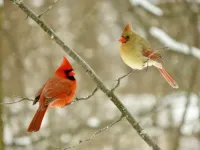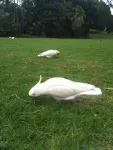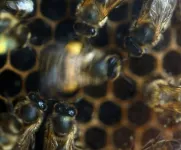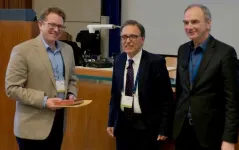(Press-News.org) Birds worldwide make strategic decisions about how they live based on their environmental conditions. Some live fast, die young, and leave as many chicks as possible. Others live long and prosper by not breeding.
A new study of non-migratory birds provides clues about how climate change may affect the long-standing evolutionary strategies of feathered friends. The work is reported in this week’s Ecology Letters and was led by Michigan State University postdoctoral fellows of the MSU Institute for Biodiversity, Ecology, Evolution, and Macrosystems (IBEEM).
The group synthesized global data about nearly 7,500 bird species to better understand the link between the variability of a bird’s environment and the strategies birds choose to best hit the evolutionary jackpot by producing future generations and not going extinct.
“A lot of factors drive key components of life history,” said Casey Youngflesh, the study’s lead author. Casey was a postdoctoral researcher in MSU’s Ecology, Evolution, and Behavior Program and now is faculty at Clemson University. “We wanted to synthesize these global data resources to see what environmental factors shape biodiversity.”
That wrangling of big data makes the study the most sweeping in addressing the strategies of resident birds. Birds that live in areas where temperatures fluctuate a lot in a single year – like Michigan’s cold winters and hot summers, but also variation within those seasons – react to fast uncertainty by not counting on tomorrow. Like the finch or the cardinal, these birds put their energy and resources into making babies even if that means they won’t live long.
Birds that live a slower-paced life with big temperature swings across years, not months, hedge their bets by counting on toughing out a rough year by not breeding. For these birds, like sulfur-crested cockatoos, the confidence of a long life can allow them to make up their progeny production later.
Although long-lived species hedge themselves against bad years, they also adapt more slowly than short-lived birds. Whether short- or long-lived, the researchers found that most species are experiencing rates of climate change that they are unlikely to be able to adapt to. And, Youngflesh said, therein lies more questions. As the Earth’s climate changes, will this change the odds of the bets animals make?
“If you only live a couple years, one bad year isn’t a big problem,” he said. “But if you have two or more bad years in a row, you are in trouble. In variable, unpredictable environments, it may pay to live a long time.”
It takes many generations for creatures to evolve, and scientists are trying to understand if this race pits evolution against climate change, to what degree, and which strategies might best position a creature for success.
IBEEM Director Phoebe Zarnetske noted that a broad view of Earth showed that these patterns exist across numerous ecosystems, including boreal forests, grasslands, and tropical jungles.
“This study provides important insights about the roles that climate change and variability have in shaping the patterns of life on Earth,” she said, noting it was a prime mission behind IBEEM’s funding of the study. “Importantly, an interdisciplinary approach—combining insights from ecology and climate science—was key to uncovering how organisms respond to climate variability.”
The study didn’t reveal precipitation as having a significant impact on strategies, co-author and climate scientist Lala Kounta says this opens discussion for future exploration, such as extreme events like heatwaves and drought are intensifying which are additional stressors for species.
“You have to understand these foundational theories before you can predict how things are going to change,” said IBEEM data scientist Kelly Kaspar. “Seeing through all the noise and finding patterns is critical, and this has been a rare opportunity to work with different disciplines – I’m in fisheries and wildlife, others are in integrated biology, geography, climate studies. There’s a lot of different expertise here.”
“Environmental variability shapes life history of the world’s birds” was also written by Adriana Uscanga, Peter Williams, and Jeffrey Doser. IBEEM is funded by an MSU Strategic Partnership Grant.
END
Environment nudges birds to fast, or slow, life lane
2025-02-25
ELSE PRESS RELEASES FROM THIS DATE:
The U-shaped relationship between admission peripheral oxygen saturation and all-cause hospital mortality in acute exacerbation of chronic obstructive pulmonary disease: a retrospective analysis using
2025-02-25
Highlight box
Key findings
• This study investigated the U-shaped nonlinear relationship between admission oxygen saturation (SpO2) and all-cause hospital mortality in patients with acute exacerbation of chronic obstructive pulmonary disease (AECOPD). The results showed that the lowest all-cause hospital mortality was observed at an SpO2 of 89.5%. Additionally, SpO2 was identified as an independent risk factor for predicting all-cause hospital mortality in AECOPD patients, providing valuable guidance for optimizing oxygen therapy in this population.
What is known and what is new?
• Most studies indicate that maintaining SpO2 levels between 88–92% provides ...
New research highlights wide variation in prostate cancer testing between GP practices
2025-02-25
A largescale study has found huge variation between GP practices on whether they are likely to pick up prostate cancer using a blood test.
The University of Exeter led a study which aimed to investigate the proportion of patients whose prostate cancer was identified by using a prostate-specific antigen (PSA) test when patients had no symptoms.
The research published in the British Journal of General Practice and funded by Cancer Research UK, and, has found that one in five patients with prostate cancer in England are diagnosed after PSA testing when they had no symptoms – fewer than previously thought. The PSA test ...
Antidepressants linked to faster cognitive decline in dementia
2025-02-25
New research suggests that antidepressants can accelerate cognitive decline in people with dementia. At the same time, some drugs appear to be less harmful than others, which can help doctors make better treatment decisions, according to the study published in BMC Medicine.
Antidepressants are often used to relieve symptoms such as anxiety, depression, aggressiveness, and sleep disturbances in dementia sufferers.
However, a new observational study based on data from the Swedish Dementia Registry (SveDem) shows that patients with dementia who are treated with antidepressants experience an increased cognitive decline compared to patients who do not ...
DNA origami suggests route to reusable, multifunctional biosensors
2025-02-25
Using an approach called DNA origami, scientists at Caltech have developed a technique that could lead to cheaper, reusable biomarker sensors for quickly detecting proteins in bodily fluids, eliminating the need to send samples out to lab centers for testing.
"Our work provides a proof-of-concept showing a path to a single-step method that could be used to identify and measure nucleic acids and proteins," says Paul Rothemund (BS '94), a visiting associate at Caltech in computing and mathematical sciences, and computation and neural systems.
A paper describing the work recently appeared in the journal Proceedings of the National Academy of Sciences. The lead authors of ...
Virginia Tech study reveals that honeybee dance ‘styles’ sway food foraging success
2025-02-25
As far as animals go, honeybees are world-class dancers.
While not as deep and complex as a Super Bowl half-time show, the bees' moves, known as the “waggle" dance, convey very specific food foraging instructions to their nestmates. The direction the dancer moves explains to other bees which way to go, and the duration of the waggle dance, or the “run,” shows how far to go. Once other bees have been convinced to follow the directions, they are “recruited.” After receiving the instructions, these ...
Beehive sensors offer hope in saving honeybee colonies
2025-02-25
A UC Riverside computer science team has developed a sensor-based technology that could revolutionize commercial beekeeping by reducing colony losses and lowering labor costs.
Called the Electronic Bee-Veterinarian, or EBV, the technology uses low-cost heat sensors and forecasting models to predict when hive temperatures may reach dangerous levels. The system provides remote beekeepers with early warnings, allowing them to take preventive action before their colonies collapse during extreme hot or cold weather or when the bees cannot regulate their hive temperature because of disease, pesticide exposure, food shortages, or other stressors. ...
Award-winning research may unlock universe’s origins
2025-02-25
University of Texas at Arlington physicist Ben Jones has received an international honor for his contributions to developing advanced instruments used in particle physics research.
Dr. Jones, an associate professor of physics, was awarded the 2025 International Committee for Future Accelerators (ICFA) Early Career Researcher Instrumentation Award. Presented by the ICFA Instrumentation Innovation and Development Panel, the award recognizes significant advancements in the innovation and development of new instrumentation for future accelerator experiments.
He accepted the award last week at the 2025 Vienna ...
BRCA1 gene mutations may not be key to prostate cancer initiation, as previously thought
2025-02-25
Mutations in the BRCA1 gene that are either inherited (germline) or acquired (somatic) might not be key to the initiation of prostate cancer, as previously thought, suggests the first study of its kind, published online in the open access journal BMJ Oncology.
If confirmed in further studies, the findings suggest that it may be time to reassess current treatment with PARP (poly(ADP-ribose) polymerase) inhibitor drugs, which block the ability of cells, including cancer cells, to repair DNA damage, in men with BRCA1 genetic variants, say the researchers.
A linked editorial suggests that the findings pave the way for greater refinement of genetic ...
Melatonin supplementation may help offset DNA damage linked to night shift work
2025-02-25
Melatonin supplementation may help offset the DNA damage associated with night shift work by boosting the body’s ability to repair it, suggest the findings of a small clinical trial published online in the journal Occupational & Environmental Medicine.
Larger studies looking at varying doses and the potential long term effects of melatonin supplementation are now warranted, conclude the researchers.
Normal night-time production of the body clock hormone, melatonin, is suppressed in night shift workers. This compromises the body’s ability to repair oxidative DNA damage, the by-product of normal cellular processes, heightening the risk of ...
Common gynaecological disorders linked to raised heart and cerebrovascular disease risk
2025-02-25
Having one or more common gynaecological disorders, such as endometriosis or heavy or irregular periods, may be linked to a heightened risk of heart disease and conditions that affect blood flow to the brain (cerebrovascular disease), finds a pooled data analysis of the available evidence published online in the journal Heart.
Although the quality of the studies included in the analysis was variable, the researchers nevertheless conclude that clinicians and the public need to be more aware of these associations to potentially mitigate the risks.
Long term non-cancerous gynaecological disorders ...




